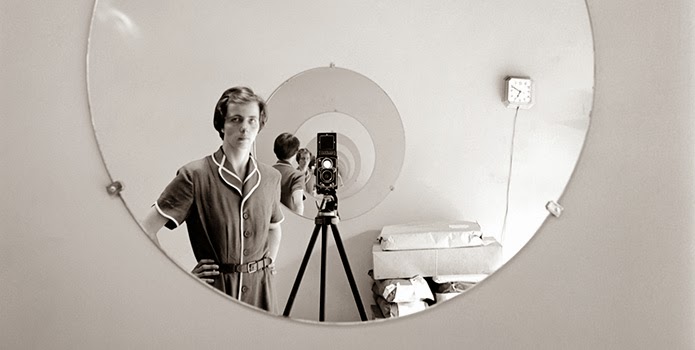Early on in Finding Vivian Maier, John Maloof (the man who paid $380 for the trove of mostly undeveloped street photography) wonders, rhetorically, "Why is a nanny taking all these photos?" Of course, this wondering is mostly for dramatic effect: Maloof, also co-director of this documentary, is simply trying to bring us into his thought process as he went about fathoming his windfall and building the life of a person based on just her work and a few personal items. But this question is cloaking another: "Why didn't this nanny try to get rich and famous with these photos?" Reviews of the unearthed corpus compared Maier's work to the likes of Diane Arbus and Robert Frank, implying that, had Maier attempted to promote her compulsion, she may have--or deserved to be--appreciated in her lifetime.
One of Vivian's closest friends--as close as one could get to Miss Maier--answers the question matter-of-factly. "That was her babies," she said of Maier's photography. "She wouldn't put her babies on display."
 |
| Maloof's windfall |
 |
| "The Music Lesson" |
Shortly after I saw Tim's Vermeer, I was listening to an interview with talk show host Conan O'Brien where he discussed the idea of "following your dreams." Medical whizs', he was complaining, are putting aside their cancer research and taking improv classes; rocket scientists are really trying to get their romcom screenplay into shape. In my own world, the ease of digital publishing has turned everybody with a penchant for describing vampires having sex into an author. Had Maier not been born in 1927, perhaps she would've abandoned her nannying to pursue her shutterbugging. O'Brien points out that the idea of dream-following is (like the idea of the teen-age) a new, circa post-WWII notion that now seems like it's been around forever.
Not to overload this with too many anecdotes, but I can't stop thinking about my first year doing a university creative writing course. Sheila Heti, then twenty-five, had just put out her first book with both McSweeney's and Anansi--maybe the hippest presses out there then. I was surrounded by twenty-year-olds declaring that if they didn't get a book published by the time they were twenty-five, they'd stop writing. Of course your early-twenties are a time defined by histrionics, and I'm sure not a single person stuck to that oath. If they stopped writing--and so many have--it wasn't on account of not getting published, but because they didn't really like doing it.
Because it's my bailiwick, it's the only thing I'll comment for sure on: if you want to "make it" as a writer, you need to seriously enjoy the process of writing. Everything that follows is beside the point. If you never have a story accepted and let that stop you from writing, then probably you aren't a writer. You may be good at writing, but you're not a writer, bud. In his wonderful book How to Write a Sentence, Stanley Fish makes an argument that love of the mechanics of language is just as important as what you're doing with those sentences, and refers to an anecdote of a painter's fundamental reason for painting being a love for the smell of paint.
All of this has me thinking about why on earth anyone makes art--or "follows their dream"--at all. Do you do it for yourself, or for the world? How important is it to you that someone sees what you've done and tells you you did it well? I have to think that, for as much as Vermeer was driven by capturing the nuances of light on a wall, he must have also loved sitting. One of the subjects in Finding Vivian Maier asks of Vivian taking a picture that she would never show anyone, "What's the point of taking it if no one sees it?" The answer feels simple: she either wanted to or she had to. So much was and has been made about J.D Salinger--to add another anecdote here--giving up on publishing, but the situation has always seemed simple to me: love for writing does not equal love for publishing.
As much as there is a mystery that's interesting as hell in Finding Vivian Maier, there's also this subliminal story about letting art be part of your life. The trend of following your dreams that O'Brien mentions is troubling, not on account of the impulse, but because of the binary it implies.
Since that post-war liberation of how we're permitting ourselves to view our purposes in life, activeness in art has maybe lost its place in our day-to-day. It's become easy to view art, the creation and consumption of it, as separate from the jobs we work or what we do when we're done those jobs. I get the sense that art has become something we need to go out of our way to do, or make a revolutionary change in favour of. A dangerous thesis thrumming underneath Maloof's project and the documentary is "Art's only as good as what's done with it."
But no matter what the market's doing, or whether or not you're getting the recognition you feel deserving of--if you're looking for recognition at all--I feel like the most important answer to why we do any of this crap will remain terse and perfect:
Just because.
--Andrew

No comments:
Post a Comment